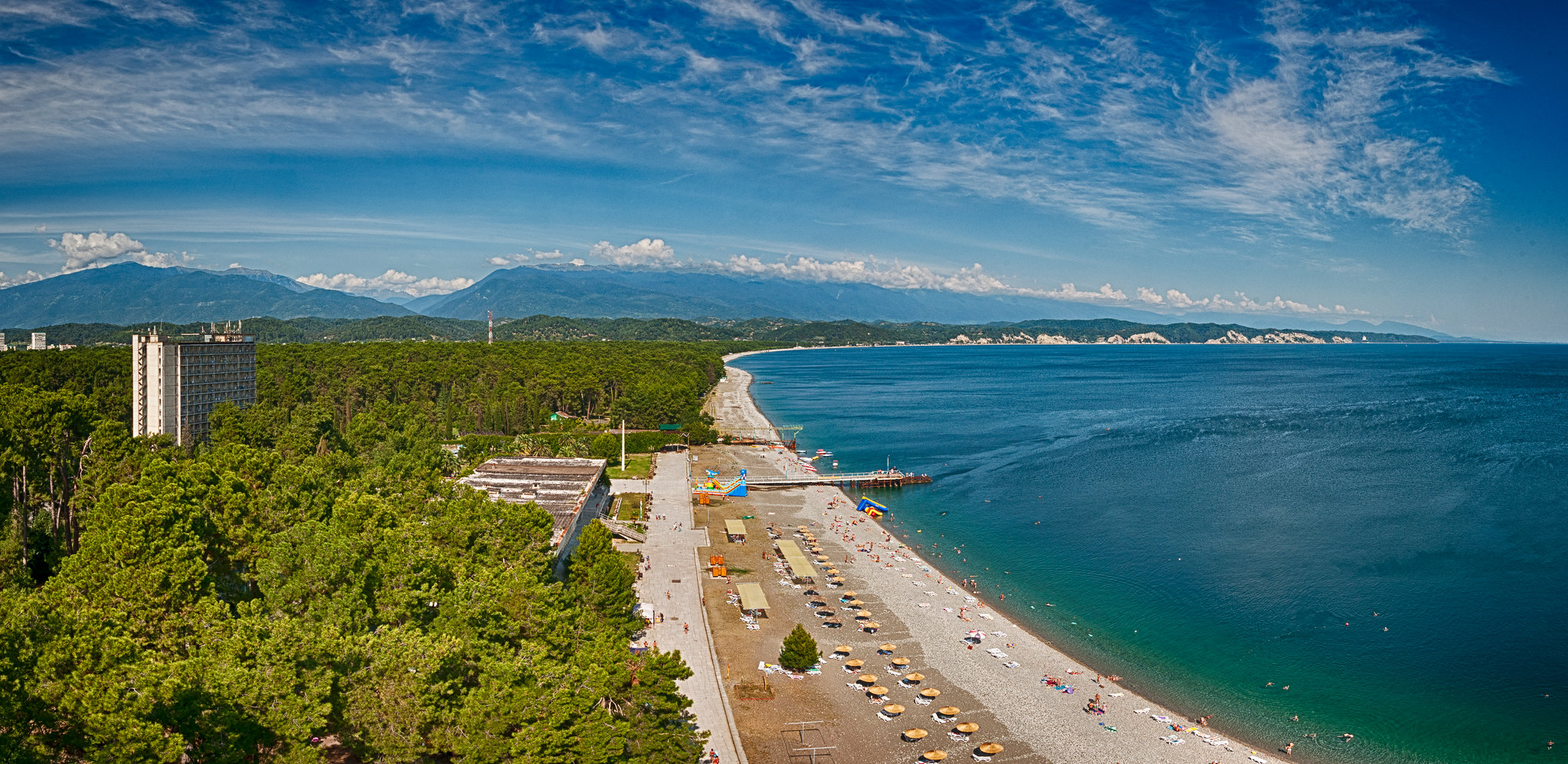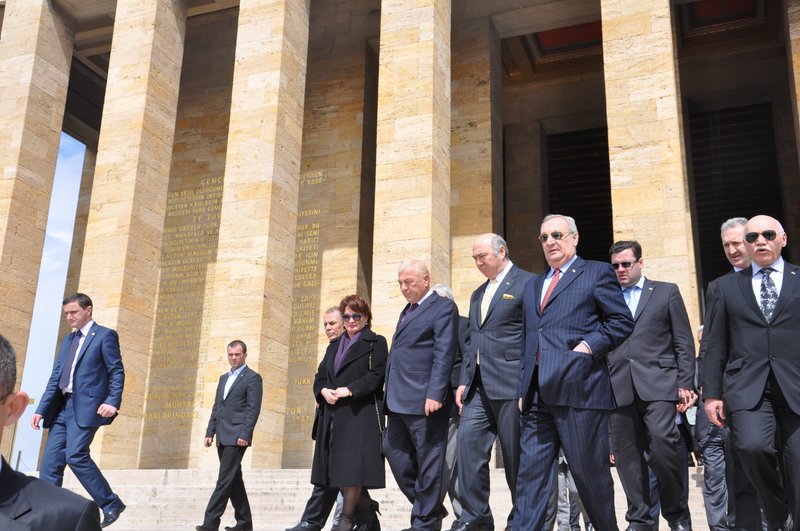Fehim Taştekin
Turkish journalist and a columnist for Turkey Pulse who previously wrote for Radikal and Hurriyet. Tastekin specializes in Turkish foreign policy and Caucasus, the Middle East, and EU affairs. France.
Abkhazia's distant and recent strategic history tells us that it is not a good "geographical destiny" to be on the borders of rival power-balances located against each other.
Why hasn't Abkhazia been successful in "international recognition" over the course of the 30 years since it embarked along the path of independence? Or, to put it another way, why has Abkhazia been recognised by far fewer countries than those who recognise Kosovo, even though they share the parameters imposed by similar power-equations?
The leading driver in Kosovo was the USA, and in Abkhazia it was Russia. The US is more successful in forcing its allies to act according to its own preferences. Russia's relationship with its allies or friends does not produce political dependence. Maybe that is why even the The Commonwealth of Independent States’ (CIS) members, whose patron is Russia, did not feel the need to follow in Moscow's footsteps. But is there not some other craftiness here? Moscow left its relations with the “de facto” independent republics to their own devices until it faced rehearsals for the “colour revolution” against Russian influence in the former Soviet geographical space. Moreover, it did not mind keeping Abkhazia under the CIS embargo until sensing that Georgia's Turkey-linked NATO intervention into Russian spheres of influence had turned Abkhazia into a Trojan Horse. Never mind Abkhazia's distinctive position, Moscow has ignored South Ossetia's request to unite with North Ossetia and join the Russian Federation.
Changing conditions and Russia's new regional policy
While Russia gradually ended the embargoes imposed on Abkhazia after the "Rose Revolution" in 2003 in Georgia, it started to strengthen its hand by means of the distribution of passports, in the face of the developments surrounding this tiny country by Georgia and its partnerships with the west targeting Russian influence in the region.
When Russia recognised Abkhazia and South Ossetia, the trigger was the bombardment of Tskhinval in August 2008 by the Georgian army, which had gained confidence from the "Train-Equip" plan carried out by the United States in close cooperation with Turkey. The Abkhazians opened a second front in solidarity with the Ossetians and took back the Upper Kodor Valley and the area where the hydro-electric power plant on the River Ingur is located and which they lost to Georgia in 1993. The step that really changed the course of history was the decision of Russia to recognise Abkhazia and South Ossetia following this war. Moscow thus took its revenge on the Western front, which recognised Kosovo's unilateral declaration of independence. But the strategic imagination was far beyond revenge. Repelling Georgia's attempted invasion, Russia recognised two "de facto" independent republics and secured its immediate surroundings as a buffer-zone.
The factors determining the direction of politics in Abkhazia changed after 2008 in parallel with the establishment of partnership-relations with Russia. In 2008, the slogan "together with Russia", which caused the loss of the election by Raul Khadzhimba, the ambitious candidate of the 2004 election, made certain a win for Sergej Bagash. But there was also a pride instilled in the Abkhazians: “Together with Russia, two equal countries, two equal leaders.”
There are reasons to open a speculative thread on the sustainability of this equation. The critical question is: did recognition by Russia bring South Ossetia and Abkhazia to the status of 'equal states'? The relationship of economic and financial dependence overshadows the goal of political and territorial domination. The fact that the relations with Georgia do not show any softening from hostility to interstate relations creates a constant perception of threat, whilst the conviction in military security from Russia becomes permanent. Of course, Abkhazian pride in historical references says otherwise. Maintaining independence is an important claim, and it is impossible to erase it from the basic codes within Abkhazian society. But the main doubt is about Russia's intentions and plans, not Abkhazia's will. If it is said that Russia is disrespectful to this will, it may be difficult to enumerate the evidence and documents to justify it. The discourse on the importance and inevitability of relations with Russia generally comes from Abkhazian circles; it is fair to say that Russians often avoid rhetoric with any 'expansionist' intentions.
Growing doubts after the Ukraine war: Is annexation an option?
Despite Moscow's careful rhetoric, the allegations that Russia keeps the possibility of incorporating Abkhazia and South Ossetia into the Federation in the future, when conditions permit, cannot be ignored.
The first doubt as to whether this scenario would come to fruition arose with the annexation of the Crimea into the Russian Federation in 2014. But Russia had no intention of opening a new front until the reaction from the West was over. By being involved in the Syrian war, Russia shifted attention from the fight in the Black Sea basin to the Middle East.
The second source of skepticism manifested itself even more troublingly with the invasion of the Ukraine in February 2022. The fact that Russia bases its interest in the former Soviet geographical space with the motive of protecting ethnic Russians or peoples who have acquired Russian citizenship inevitably leads to questions about the future of Abkhazia. Of course, Abkhazia is a country which is friends with Russia. While both the government and the opposition embrace the alliance with Russia in Abkhazia, there are divergences over the dependence on Moscow, which the Russians do not need to worry about. While the doors of a world other than Russia have not been opened for Abkhazia, there does not seem to be a reason to force Moscow to take further steps in domestic political dynamics. However, when the plan to transfer to Russia a 185-hectare paradise-like region in Pitsunda, where Soviet leaders used to spend their holidays, came to the fore at a time when the war in the Ukraine was still in train, discussions about the future of sovereignty also flared up. However, the liveliness of the debates in society and politics confirms that there is a remarkable sensitivity about the transfer of sovereign rights.

Being under the auspices of Russia provides protection against Georgia's interventionist approach, which it keeps alive with the claim of preserving "territorial integrity". This is an important foothold. However, this situation exhausts the possibility of Abkhazia being recognised especially in the Western camp. In fact, the Abkhazians’ expectations of recognition and an international presence are quite modest in the face of geostrategic realities. The emphasis we heard many times during our conversations with political and intellectual circles in Sukhum was: "If Russia and Turkey recognised us, it would be enough."
Turkey and Russia are enough, but how?
The course of a small geography in the international arena depends to a great extent on the changes in the political fault-lines outside of it. In this slice of history, Abkhazia considers reliance on Russia as an existential issue. Turkey can be constructed as an alternative area to balance Russia. The dynamics of expectations from Turkey, offering an alternative economic area, being a corridor extending to Europe, and the intersection of motherland and diaspora in the historical background make Abkhazia's interest in this country inevitable. The fact that the Abkhazian population in the diaspora is 5-6 times greater than in the homeland inevitably brings Turkey to the fore. However, the opposition to Turkey's international alliance with Russia has not allowed relations between Sukhum and Ankara until now. Turkey's establishment of the equation in the South Caucasus (Transcaucasus) through Georgia has completely taken hostage Ankara's policy regarding Abkhazia.
It is possible to say that efforts to establish relations with Turkey were met with a "disreputable" response, and although the Abkhazians took offence, hopes that this situation will change one day are preserved. The historical background very well explains the difficulties of cooperating with Turkey:
- After the Bolshevik revolution taking the opportunity of the clashes between the White Army and the Red Army, the first country on whose doors the Caucasian peoples knocked when they founded the North Caucasus Republic on 11 May 1918 was the Ottoman state. On 8 June 1918, Istanbul had recognised the independence of only this Caucasian republic and signed a friendship- and aid-agreement. But this republic, which was/is the symbol of Caucasian unity, did not survive long enough even to see the end of the Ottoman Empire.
- The President of the Abkhazian Soviet Socialist Republic, Nestor Lakoba, negotiated with Mustafa Kemal Atatürk and Rauf Orbay during his three visits to Turkey in the 1920s both bilateral relations and the return of the diaspora to the homeland. Lakoba named his son Rauf because of his friendship with Orbay, who was originally Abkhazian.
- After the collapse of the Soviet Union, the leader of Abkhazia, Vladislav Ardzinba, first knocked on Turkey's door. Ardzinba had gone to Istanbul, not Moscow, the day after the Abkhazian Parliament decided to cancel the 1978 Constitution and pass the 1925 Constitution, that is, to remove its constitutional ties with Georgia and embark on the path of independence on 22 July 1992. However, the Prime Minister of the Republic of Turkey at the time, Süleyman Demirel, not only rejected Ardzinba, but also prevented him meeting with the opposition and the media. While the leader of Abkhazia was waiting for an appointment in his hotel-room, Demirel flew to Tbilisi with Foreign Minister Hikmet Çetin on 30 July 1992 and signed six agreements with Eduard Shevardnadze, which confirmed the territorial integrity of Georgia on the map, which, of course, had been the product of Soviet administrative engineering. Georgia, with the strength of the agreements with Turkey, brought troops into Abkhazia on 14 August 1992.
- The policy that sacrificed Abkhazia to Georgia repeated itself in 2007. The President of Abkhazia, Sergej Bagapsh, wanted to visit Turkey, thinking that the international climate, which inclined to recognise Kosovo's unilateral declaration of independence in 2007, might also be of some benefit Abkhazia. Ankara stated that it would only allow Bagapsh's visit if he accompanied Georgian President Mikhail Saakashvili. It was a condition that Sukhum could not accept. Thereupon, Bagapsh forgot official contacts and requested permission for a special trip to embrace the diaspora. Although Turkey accepted the proposal, but the green light turned red when Tbilisi stepped in.
- After the 2008 war, while Turkey started a new initiative within the framework of the "Caucasus Stability and Cooperation Platform", in order to influence the conflict between Abkhazia and Georgia in favour of Tbilisi, it decided to take Sukhum to the close but there was no concrete development.
- Following the crisis that broke out when Georgia seized Turkish ships trading with Abkhazia in open waters of the Black Sea, Ankara sent Deputy Undersecretary of Foreign Affairs Ünal Çeviköz to Sukhum on 8 September 2009. According to Abkhazians, this visit could be considered a milestone in terms of Turkey-Abkhazia relations. But the way and method of starting relations contained elements that were unacceptable for Abkhazia. The Turkish government thought that building a mosque in Sukhum would be a good start. However, the plan was made conditional on obtaining approval from Tbilisi and working in coordination with the Georgian authorities. Since Sukhum did not approve of the method followed, this novel diplomatic manoeuvre had failed.
- Bagapsh's desire to meet Abkhazians in Turkey became possible through an informal visit in 2011. Official institutions did their best not to address Bagapsh. The bitterness of the diaspora only grew.

There has always been an expectation that, if Turkey normalises relations with Armenia, the importance it attaches to Georgia in the Caucasus will decrease, and this will positively affect the approach to Abkhazia. Stanislav Lakoba, the historian and father of the Lykhny Declaration of March 1989, expressed this expectation while answering my questions in Sukhum in 2009.
Possible effects of Turkish-Russian rapprochement
With a similar logic, there are evaluations that this will have positive repercussions on Abkhazia, while expanding strategic relations with Russia in parallel with the tensions Turkey has with the West. Here, as much as the potential change in Turkey's preferences, the extent to which Russia will allow the Turks to assume a role in the Caucasus is also important. It is obvious that the Caucasus has historically been a Turkish-Russian area of competition;, Russia won this fight, and the Russians will not easily yield their strategic superiority.
Stanislav Lakoba, in his capacity as Chairman of the Committee on Foreign Affairs and Inter-Parliamentary Relations of the Supreme Soviet of the Republic of Abkhazia, at the conference on the North Caucasus in Our Age, held in London on 23 April 1993, when Abkhazia was under the occupation of Georgian troops, said: “Today, some are saying 'Abkhazia is Russia', some are saying 'Abkhazia is Georgia,’ but 'Abkhazia is Abkhazia'. We do not want to lose our own face as the curtain of the 20th century is comes down. There may be people who don't like our face, but this is the face we have.”
How long will Lakoba's words remain valid in the future of Abkhazia, as the repercussions of the Ukrainian war reinforce the perception that Russia has started to retrace its footsteps to empire? Time will tell...
![Abkhazia: [14 August] 1992-2022](/images/banners/logo.png#joomlaImage://local-images/banners/logo.png?width=40&height=33)
